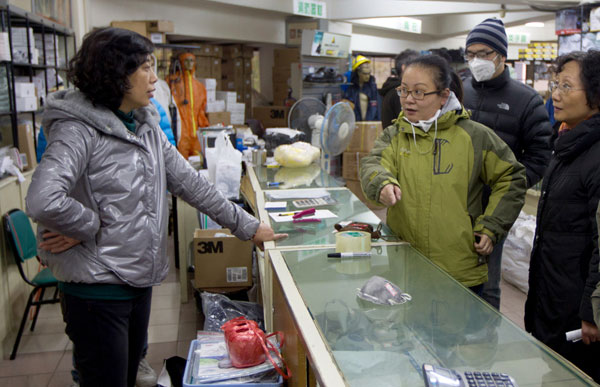 |
| Protective masks sell out at a store in Shanghai on Monday as demand increases. The city has been shrouded in smog for a week.[GAO ERQIANG / CHINA DAILY] |
Heavy air pollution is taking its toll on Shanghai's department stores and shopping malls as people reduce their outdoor activities.
By contrast, the number of tourists opting for vacations on islands and in forests that promise fresh air away from the suffocating haze is on the rise.
Following Friday's record air pollution levels, Shanghai was shrouded once again in acrid smog on Monday. The air quality index published by the US Consulate stood at 442 ("hazardous") at 7 am, falling to 185 ("unhealthy") by 5 pm. The figures reported by the Shanghai Environmental Monitoring Center were 179 and 238 at those same times.
It was hoped that a cold front and associated winds from northern China would blow dust particles out of the city, but the front failed to reduce Shanghai's pollution on Monday.
"That's because the pollutants that have accumulated these days cannot be blown away in one shot," said Wu Rui, a meteorologist at the Shanghai Meteorological Bureau.
The cold front actually carried pollutants in from Jiangsu and Anhui provinces, which are meteorologically upstream. Those places also experienced heavy air pollution in recent days, Wu said.
Pollution levels in Shanghai are expected to see a major improvement beginning Tuesday because the cold front has helped scour the air in the northern cities.
In Beijing, the official air quality index reading stood at a mere 11 as of 5 pm on Monday, meaning the city's air quality was excellent.
"The direction and speed of the wind from the north is more favorable to Shanghai, and will dramatically improve its air quality," Wu said. "Visibility keeps getting better."
The severe pollution, which has prompted some expatriates to reconsider their long-term plans to stay in Shanghai, has also reduced customers at major shopping malls and markets, according to media reports. But that's not necessarily forcing changes to sales strategies.
"As far as I know, Ikea has not changed its strategy because of the air pollution," said Emma Liu, a public relations officer for the Swedish furniture provider. "But we are celebrating our 15th anniversary in China these days with big discounts, and that encourages customers to shop more in the smoggy weather."
Local media quoted unidentified sources as saying that some department stores in Shanghai had experienced stagnant sales over the weekend despite year-end promotions.
In at least two sectors, business improved as people became less willing to go outdoors into hazardous air. Catering businesses in Shanghai saw a big increase in their food-delivery services, for example, while restaurants saw a rise in the consumption of mu'er, or fungus, which is believed to moisten lungs and alleviate the effects of inhaled pollutants.
"All dishes made with mu'er, — fried with meat or vegetables — are very popular these days," said Li Hui, the owner of a restaurant near a cluster of international consulates in Shanghai's Xuhui district.
"Demand for food deliveries has surged a lot," she said. "Of the people coming to our restaurant, 80 percent are wearing a mask."
In the tourism sector, air pollution is significantly influencing travelers' choice of vacation destinations.
"Over the weekend, we have seen people cancel their trips to cities with severe pollution, like Nanjing," said Peng Liang, an official in the vacation department at online travel-services provider Ctrip. The air quality index reading for Nanjing stood at 317 as of 11 am on Monday.
On the other hand, destinations with relatively clear air — such as Xiamen, in Fujian province, Sanya, in Hainan, and Lijiang, in Yunnan — have become more popular, he said.
"People didn't pay special attention to air quality when they chose destinations before, but now clean air is a major attraction, especially for the senior age group," Peng said.
On Monday, some lawmakers urged the government to issue warnings and adopt differentiated measures for people in various age groups.
"Young children are more vulnerable to pollutants, so classes in kindergartens and primary schools should be suspended on such polluted days," said Hu Min, a deputy to Shanghai Municipal People's Congress.
Without unveiling details, the city's top environmental protection body promised on Monday to work more closely with nearby regions in the fight against air pollution.
The Yangtze River Delta region will have a cooperative action plan soon to combat air pollution, said Zhang Quan, head of the Shanghai Environmental Protection Bureau.
"The target is to reduce the concentration of PM2.5 by 20 percent in 2017 from 2012 levels in Shanghai and the provinces of Zhejiang and Jiangsu," Zhang said.
 Heavy cargo flights taking off
Heavy cargo flights taking off In pictures: PLA's digital equipment
In pictures: PLA's digital equipment  Americans mark Thanksgiving Day with parades
Americans mark Thanksgiving Day with parades Love searching stories in cities
Love searching stories in cities  Shanghai shrouded in heavy fog
Shanghai shrouded in heavy fog Office ladies receive ‘devil’ training in mud
Office ladies receive ‘devil’ training in mud China's first nude photographer
China's first nude photographer Selected sports photos of the week
Selected sports photos of the week Treasure of Chinese culture- Nuo Dance
Treasure of Chinese culture- Nuo Dance  Youths in Night club: photo story
Youths in Night club: photo story Models dazzle at Int'l Yacht Model Pageant
Models dazzle at Int'l Yacht Model Pageant  Crystal scenery in China: Jilin fog glaze
Crystal scenery in China: Jilin fog glaze  Tianjin holds first pole dance championship
Tianjin holds first pole dance championship  Annual Santa Claus parade held in Canada's Montreal
Annual Santa Claus parade held in Canada's Montreal China's aircraft carrier passes through Taiwan Strait
China's aircraft carrier passes through Taiwan StraitDay|Week|Month